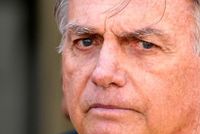In a dramatic turn of events that has gripped Brazil and drawn international attention, former President Jair Bolsonaro is now at the center of a sprawling investigation into his alleged attempts to overturn the country’s 2022 presidential election. According to a 170-page federal police report reviewed by The Associated Press, The New York Times, and other major outlets, authorities uncovered messages and documents on Bolsonaro’s phone suggesting he considered fleeing to Argentina and seeking political asylum as early as February 2024.
The revelations come at a precarious moment for Bolsonaro, who is currently under house arrest and awaiting a Supreme Court ruling—expected between September 2 and 12, 2025—on charges that he plotted a coup after losing the presidency to Luiz Inácio Lula da Silva. If convicted, the 70-year-old former leader faces up to 40 years in prison and permanent political banishment.
The police investigation, submitted to Brazil’s Supreme Court, details how Bolsonaro prepared a 33-page draft letter addressed to Argentine President Javier Milei, a fellow right-wing populist. The document, dated February 10, 2024, was saved on Bolsonaro’s phone just two days after authorities raided his home and office as part of the coup plot probe. In the letter, Bolsonaro wrote: “I, Jair Messias Bolsonaro, request political asylum from Your Excellency in the Republic of Argentina, under an urgent regime, as I find myself in a situation of political persecution in Brazil and fear for my life.”
While it remains unclear if the asylum request was ever formally sent to the Argentine government—whose spokesperson told The Associated Press they had received no such communication—the draft’s existence has fueled speculation about Bolsonaro’s intentions. Days after drafting the letter, Bolsonaro reportedly spent two nights at the Hungarian Embassy in Brasília, a move widely interpreted as an attempt to avoid arrest or seek protection from another right-wing ally, Prime Minister Viktor Orban. When pressed about his stay at the embassy, Bolsonaro refused to offer an explanation, The New York Times reported.
The police report goes further, accusing Bolsonaro of violating the terms of his house arrest. Justice Alexandre de Moraes, who oversees the case, had ordered Bolsonaro to wear an ankle monitor, avoid foreign embassies, and refrain from using social media or communicating with his son Eduardo Bolsonaro—now residing in the United States—or other allies charged in the alleged coup plot. Investigators say Bolsonaro ignored these orders, instead spreading content to his supporters aimed at undermining Brazil’s democratic institutions, including the Supreme Court and Congress.
“Bolsonaro’s actions sought to directly hit Brazilian democratic institutions, notably the Supreme Court and even Brazil’s Congress,” federal police wrote in their report, according to The Associated Press. The report also details how Bolsonaro’s son, Eduardo, a federal lawmaker, was accused of engaging in conduct intended to interfere with the criminal proceedings. Eduardo, who has visited the White House multiple times in recent months to seek U.S. intervention on his father’s behalf, has denied any wrongdoing, stating, “I never aimed at interfering in any ongoing proceedings in Brazil.” He further described his conversations with his father as “absolutely normal,” characterizing the investigation as politically biased.
Private exchanges between father and son, as revealed in the report, show discussions about publicly praising former U.S. President Donald Trump in hopes of swaying legal outcomes in Brazil. In one message, Eduardo warned his father, “You won’t have time to reverse the situation if the guy here turns his back on you. Everything here is very touchy, every little thing affects you.” Eduardo also expressed concerns about the political climate in the U.S., saying, “Even inside the White House, there are people telling (Trump): ‘OK, Brazil is gone. Let’s move on.’”
Eduardo claimed to have secured U.S. government support for his father “with great difficulty,” asserting that he and an ally, Paulo Figueiredo, were the only ones with access to the White House. He told Bolsonaro that Trump’s pressure was his “only chance” to avoid prison, texting on July 10, “The most powerful man in the world is on your side. We did our part.”
The international implications of the case have been significant. In July 2025, Trump imposed 50% tariffs on certain Brazilian exports, explicitly linking the move to Bolsonaro’s ongoing trial and demanding that Brazil drop the case against him. The U.S. also imposed sanctions on Brazilian Supreme Court Justice Alexandre de Moraes, accusing him of politically motivated actions—sanctions typically reserved for individuals accused of grave human rights abuses.
Back in Brazil, the police operation in February 2024 that triggered the asylum draft also saw Bolsonaro’s passport confiscated, several top aides arrested, and their homes and offices searched. Evangelical pastor Silas Malafaia, a prominent Bolsonaro ally, had his passport and cell phone seized but was not formally accused of obstruction of justice. Meanwhile, Bolsonaro made repeated attempts to have his passport returned, all of which were denied by Justice de Moraes, who cited him as a flight risk.
The federal police report, which includes screenshots, text messages, and voice notes, argues that Bolsonaro’s asylum request and embassy stay were clear signs he intended to evade the investigation into his alleged attempt to remain in power after his electoral defeat. Prosecutors allege that Bolsonaro and several allies orchestrated a broad conspiracy to overturn the 2022 election, dismantle courts, and even plotted to assassinate President Lula and Justice de Moraes. In pretrial depositions, Bolsonaro denied any knowledge of assassination plans but admitted to studying “ways within the Constitution” to stay in office after his defeat. He and his supporters have continued to claim, without evidence, that the election was stolen.
The fallout from Bolsonaro’s actions has been far-reaching. After he left office, thousands of his supporters stormed and ransacked government buildings in Brasília, demanding the military declare the election invalid—a scene reminiscent of the January 6, 2021, assault on the U.S. Capitol by Trump supporters.
As Brazil’s Supreme Court prepares to announce its verdict in the coming weeks, the country remains on edge. The outcome will not only determine Bolsonaro’s fate but could also set a precedent for how Brazil—and perhaps other democracies—handle attempts to subvert the electoral process. For now, the former president’s future hangs in the balance, as new details continue to emerge from one of the most consequential investigations in Brazil’s recent history.



